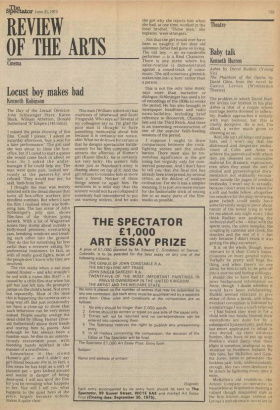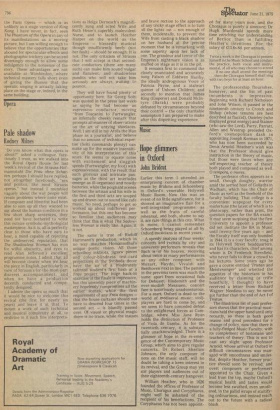Theatre
'Baby talk
Kenneth Hurren
Ashes by David Rudkin (Young Vic) The Phantom of the Opera by David Giles, from the novel by Gaston Leroux (Wimbledon Theatre) The problem in which David Rudkin invites our interest in his play Ashes is that of a couple whose marriage seems doomed to infertility. Rudkin approaches it initially with wan humour, but this is cruelly deceptive. He is not, I'm afraid, a writer much given to cheering us up.
Well, life isn't all bingo and paper hats, and I won't say that the distressed and desperate endeavours of Colin and Anne to achieve the parenthood with which they are obsessed are unsuitable material for dramatic exploration, even when they entail the sort of clinical and gynaecological documentation not ordinarily encountered outside the pages of medical textbooks. I won't say it, actually, because I don't want to be taken for a soft and feeble fellow, altogether too sensitive for the play-reviewing game (which could easily have some fervently surgical piece about cancer of the bowel lying in wait for me almost any night now). I did think Rudkin was pushing the technical stuff a bit — what with the sperm tests, the urine samples, the coupling by calendar and clock, the douches and the rest of it — but only because I didn't think it was getting the play anywhere. .. • It is, on the whole, though, more relevant to it than Colin's loquaciousness on more general topics. Verbally he pretty well hogs the thing, and when there's no one about for him to talk to, he gets off into a morose and boring soliloquy. I should like to have had a little more background information on Anne, though I doubt whether it would have been exhilarating. Rudkin seemed reluctant to give either of them a break, and when eventual conception is followed by a miscarriage I was a touch relieved — I had feared they were in for a child with two heads. Instead their aspirations are done for by a subsequent hysterectomy, and their last-resort application to adopt is also denied. AS their ultimate burden, they have to put up with Rudkin's weird fancy that their plight is somehow analogous to the situation in Northern Ireland. By this time, Ian McKellen and Gemma Jones, hired to personate the luckless pair, look, understandably enough, like two trees destined to be struck by lightning every time it rains.
McKellen's old roadshow, the Actors' Company co-operative, is meanwhile at Wimbledon making a valiant though misguided stab at the first known stage version of Leroux's melodramatic novel set in
the Paris Opera — which is as unlikely as a stage version of King Kong. I have never, in fact, seen The Phantom of the Opera in any of its manifestations as a moving picture, but I am willing enough to believe that the opportunities that abound for spectacular effects and photographic trickery can be seized divertingly enough to allow some indulgence to the nonsense of the story. These advantages are not available at Wimbledon, where technical mastery falls short even of giving the illusion that the operatic singing is actually taking place on the stage or, indeed, in the same building.



































 Previous page
Previous page